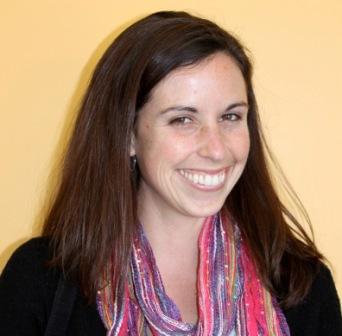A native of Kansas, Eileen Horn (MS-ETC ’07) brought back home what she learned at UVM and has been working ever since with local governments, residents, and businesses in Lawrence, Kansas to create more environmentally sustainable communities. She was hired in 2010 as the sustainability coordinator for Douglas County and for Lawrence, home to the University of Kansas.
Of the 115,000 residents that make up the county, 95,000 live in Lawrence, the county seat. “It made sense for both local governments to contribute to a shared staff position to coordinate sustainability efforts,” points out Eileen.
“My time at RSENR and my M.S. project taught me the value of cultivating a ‘sense of place,’” she acknowledges. “Although I loved Burlington, the Northeast wasn’t my place. As a Midwesterner, I felt that it was really important to move back and engage my fellow Heartlanders in authentic, place-based conversations about climate change. Each place has its assets, challenges, and special landscapes. Leveraging these assets for positive behavioral change is fascinating, fulfilling work.”
As a master’s student in RSENR, Eileen served as editor of the School newsletter. For her graduate research with advisor Professor Stephanie Kaza, Eileen worked on participatory action research with Sol Verde Cooperativa, an NGO in Guanacaste, Costa Rica. She used participatory research methods to create an education for sustainable development program, both formed and informed by community participation. Her work resulted in a community gardening program. She found that a participatory democratic process, nonformal and reciprocal learning, and empowerment of participants provided a useful methodology for designing educational programs that meet the goals of sustainable development.
Immediately after graduating from UVM, Eileen put her new found participatory methodologies to work as director of outreach and education for the Climate and Energy Project (CEP) of the Land Institute in Kansas. She co-created an award-winning energy efficiency contest between six Kansas municipalities and founded the Kansas chapter of Interfaith Power and Light, assisting congregations as they put their faith into action to address climate change. “This taught me the importance of engaging multiple audiences in the conversation about climate change,” she says.
In her current position in Lawrence, Eileen coordinates city and county initiatives in energy efficiency, renewable energy, waste reduction/recycling, local foods, and sustainable economic development. She serves as chief public contact for these initiatives and coordinates citizen outreach programs to communicate the city and county sustainability goals and projects.
“Some of the most exciting work revolves around our Douglas County Food Policy Council, a group of stakeholders from all elements of the food system, working to improve our region's access to locally-produced foods,” Eileen explains. “This past year, we created an innovative land lease program that makes previously vacant city properties available to community gardeners and urban farmers for free for food production. In exchange for the free land, growers commit to a “community benefit plan” where they propose programs, donations, [or other ways to give back] that benefit the broader community.”
Eileen and the city of Lawrence are also working toward creating sustainable buildings and vehicle fleets – from LED lighting retrofits to public electric vehicle charging stations. Their most recent building projects have been U.S. Green Building Council LEED (Leadership in Energy and Design)-certified, and they are expanding their curbside recycling program to include all materials and compost.
Eileen lives in Lawrence, a vibrant college town very similar to Burlington, Vermont. She hikes the prairies and woods of northeastern Kansas and has served for several years on the board of a natural foods cooperative.
